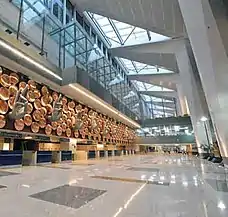Indira Gandhi International Airport
Indira Gandhi International Airport (IATA: DEL, ICAO: VIDP) is the primary international airport serving Delhi, the capital of India, and the National Capital Region (NCR). The airport, spread over an area of 5,106 acres (2,066 ha),[4] is situated in Palam, Delhi, 15 km (9.3 mi) south-west of the New Delhi Railway Station and 16 km (9.9 mi) from New Delhi city centre.[5][6] Named after Indira Gandhi (1917–1984), the former Prime Minister of India, it is the busiest airport of India in terms of passenger traffic since 2009.[7] It is also the busiest airport in the country in terms of cargo traffic, overtaking Mumbai during late 2015. As of now, it is the one of the world's busiest airports by passenger traffic. It is the second busiest airport in the world by seating capacity,[8][9][10] having a seating capacity of 3,611,181 seats, and the busiest airport in Asia by passenger traffic handling nearly 37.14 million passengers in 2021.[9][10]
Indira Gandhi International Airport | |||||||||||||||||||||||
|---|---|---|---|---|---|---|---|---|---|---|---|---|---|---|---|---|---|---|---|---|---|---|---|
 | |||||||||||||||||||||||
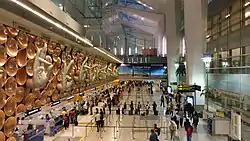 | |||||||||||||||||||||||
| Summary | |||||||||||||||||||||||
| Airport type | Public | ||||||||||||||||||||||
| Owner/Operator | Delhi International Airport Limited (GMR Group-AAI-Fraport consortium) | ||||||||||||||||||||||
| Serves | National Capital Region | ||||||||||||||||||||||
| Location | Palam, Delhi, 110037, India | ||||||||||||||||||||||
| Opened | 1962 | ||||||||||||||||||||||
| Hub for |
| ||||||||||||||||||||||
| Focus city for | FedEx Express | ||||||||||||||||||||||
| Elevation AMSL | 237 m / 777 ft | ||||||||||||||||||||||
| Coordinates | 28°34′07″N 077°06′44″E | ||||||||||||||||||||||
| Website | Delhi Airport | ||||||||||||||||||||||
| Map | |||||||||||||||||||||||
 DEL/VIDP 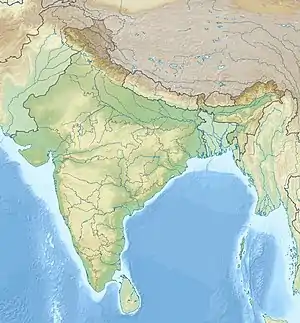 DEL/VIDP  DEL/VIDP  DEL/VIDP  DEL/VIDP | |||||||||||||||||||||||
| Runways | |||||||||||||||||||||||
| |||||||||||||||||||||||
| Statistics (April 2021 - March 2022) | |||||||||||||||||||||||
| |||||||||||||||||||||||
The airport was operated by the Indian Air Force before its management was transferred to the Airports Authority of India.[11] In May 2006, the management of the airport was passed over to Delhi International Airport Limited (DIAL), a consortium led by the GMR Group.[12] In September 2008, the airport inaugurated a 4,430 m (14,530 ft) runway. With the commencement of operations at Terminal 3 in 2010, it became India's and South Asia's largest aviation hub. The Terminal 3 building has a capacity to handle 34 million passengers annually and was the world's 8th largest passenger terminal upon completion.[6] The airport uses an advanced system called Airport Collaborative Decision Making (A-CDM) to help keep takeoffs and landings timely and predictable.[13]
In 2010, IGIA was conferred the fourth best airport award in the world in the 15–25 million category, and Most Improved Airport in the Indo-Pacific Region by Airports Council International.[14] The airport was rated as the Best Airport in the world in the 25–40 million passengers category in 2015, by Airports Council International.[15][16] Delhi Airport was awarded The Best Airport in Central Asia and Best Airport Staff in Central Asia at the Skytrax World Airport Awards 2015.[17] IGI also stood first in the new rankings for 2015 Airport Service Quality (ASQ) Awards conducted by Airports Council International.[18] The airport, along with Mumbai Airport was adjudged as the "World's Best Airport" at the Airport Service Quality Awards 2017, in the highest category of airports handling more than 40 million passengers annually.[19] In the financial year of 2020, the airport handled 67.3 million passengers.[20]
The other airport serving NCR is the Hindon Airport, which is much smaller in size and primarily handles regional flights out of the city under the UDAN Scheme.[21] The former airport, which used to be the primary airport of NCR, Safdarjung Airport is now used mainly by VVIP helicopters and small charter helicopters due to its short runway. To stimulate the increasing traffic, a second airport, Noida International Airport is being constructed to offset the load of Indira Gandhi International Airport.[22] The airport was awarded the "best airport" in Asia-Pacific in 2020 (over 40 million passengers per annum) by the Airports Council International.[23]
History

Safdarjung Airport was built in 1930 and was the main airport for Delhi until 1962.[4] Due to increasing passenger traffic at Safdarjung, civilian operations were moved to Palam Airport (later renamed to IGIA) in 1962.[4] Palam Airport had been built during World War II and after the British departed from India, it served as an Air Force Station for the Indian Air Force.
Palam Airport had a peak capacity of around 1,300 passengers per hour.[4] In 1979–80, a total of 3 million domestic and international passengers flew into and out of Palam Airport.[24] Owing to an increase in air traffic in the 70s and the 80's, an additional terminal with nearly four times the area of the old Palam terminal was constructed. With the inauguration of this new international terminal, Terminal 2, on 2 May 1986, the airport was renamed as Indira Gandhi International Airport (IGIA).[4]
The old domestic airport (Palam) is known as Terminal 1 and was divided into separate buildings – 1A, 1B, and 1C. Blocks 1A and 1B were used to handle international operations while domestic operations took place in 1C. Today, Block 1A became a dedicated terminal for domestic Air India, which is now demolished. Block 1B was used as a departures terminal by all other domestic airlines, which is also demolished. Block 1C was turned into a domestic arrivals terminal, and the newly constructed domestic departures block 1D is now used by all domestic low-cost airlines (IndiGo, and SpiceJet). There is also a separate technical area for VIP passengers. However, Terminal 1D was expanded with a brand new arrivals hall, negating the need for Terminal 1C, and it was renamed as simply Terminal 1. For the expansion work, GoAir and select flights of IndiGo were moved to Terminal 2 as well as select flights of SpiceJet and IndiGo to Terminal 3.
The Delhi Airport gained a nonstop flight to North America in October 2001, when an Airbus A340 belonging to Canada 3000 touched down from Toronto. Even though the 11 September attacks had precipitated a global decline in air travel, Canada 3000 proceeded with launching the route, hoping it would help improve the airline's financial position.[25][26] The opening of Russian airspace after the Cold War allowed pilots to fly over the Arctic, thereby reducing the flight duration.[27] Nevertheless, Canada 3000 collapsed just one month after the service began.[28]
Significant growth in the Indian aviation industry led to a major increase in passenger traffic. The capacity of Terminal 1 was estimated to be 7.15 million passengers per annum (mppa). The actual throughput for 2005/06 was an estimated 10.4 million passengers. Including the closed down international terminal (Terminal 2), the airport had a total capacity of 12.5 million passengers per year, whereas the total passenger traffic in 2006/07 was 16.5 million passengers per year.[29] In 2008, the total passenger count at the airport reached 23.97 million. To ease the traffic congestion on the existing terminals, a much larger Terminal 3 was constructed and inaugurated on 3 July 2010.[30] The new terminal's construction took 37 months for completion and this terminal increased airport's total passenger capacity by 34 million.[30] Apart from the three budget domestic airlines handled by Terminals 1 and 2, all other airlines operate their flights from Terminal 3. On 1 June 2022, Delhi International Airport becomes India's first to run entirely on Hydro Power and solar energy.[31]
Ownership
On 31 January 2006, the aviation minister Praful Patel announced that the empowered Group of Ministers have agreed to sell the management-rights of Delhi Airport to the DIAL consortium and the Mumbai Airport to the GVK Group.[32] On 2 May 2006, the management of Delhi and Mumbai Airports were handed over to the private consortia.[33] Delhi International Airport Limited (DIAL) is a consortium of the GMR Group (54%), Fraport (10%) and Malaysia Airports (10%),[34] and the Airports Authority of India retains a 26% stake.[35]
Nine years later, in May 2015, Malaysia Airports chose to exit from DIAL venture and sold its entire 10% stake to majority shareholder GMR Infra for $79 million. Following this GMR Group's stake at DIAL increased to 64%.[36] Earlier GMR indicated that it was interested in buying out the 10% stake of Fraport.[37]
Facilities
Runways
_Interior_of_New_Delhi_Airport.jpg.webp)
| Runway Number | Length | Width | Approach Lights/ILS[6] |
|---|---|---|---|
| 11R/29L | 4,430 m (14,530 ft) | 60 m (200 ft) | CAT III-B / CAT III-B |
| 10/28 | 3,813 m (12,510 ft) | 46 m (151 ft) | CAT I / CAT III-B |
| 09/27 | 2,816 m (9,239 ft) | 45 m (148 ft) | CAT I / CAT I |
Delhi Airport has three near-parallel runways: runway 11R/29L, 4,430 m × 60 m (14,530 ft × 200 ft) with CAT IIIB instrument landing system (ILS) on both sides, runway 10/28, 3,813 m × 46 m (12,510 ft × 151 ft), and runway 09/27, 2,816 m × 45 m (9,239 ft × 148 ft). The 09/27 runway of the Delhi Airport was the airport's first-ever runway, the British constructed the 2,816 metre-long and 60 metre-wide runway in the pre-independence era and used it during World War II.[38] In addition to Chaudhary Charan Singh International Airport in Lucknow and Jaipur Airport in Jaipur, Delhi Airport is the only airport in India to have been equipped with the CAT III-B ILS, as of 2017.[39] In the winter of 2005, there were a record number of disruptions at Delhi Airport due to fog/smog. Since then some domestic airlines have trained their pilots to operate under CAT-II conditions of a minimum 350 m (1,150 ft) visibility. On 31 March 2006, IGI became the first Indian airport to operate two runways simultaneously following a test run involving a SpiceJet plane landing on runway 28 and a Jet Airways plane taking off from runway 27 at the same time.
The initially proposed mode involving simultaneous takeoffs in westerly flow to increase handling traffic capacity caused several near misses over the west side of the airport where the centrelines of runways 10/28 and 9/27 intersect.[40] The runway use was changed to segregate dependent mode on 25 December 2007, which was a few days after the deciding near miss involving an Airbus A330-200 of Qatar Airways and an IndiGo A320 aircraft. The new method involved the use of runway 28 for all departures and runway 27 for all arrivals. This more streamlined model was adopted during day hours (– 2300 0600 – 2300 IST) until 24 September 2008.
On 21 August 2008, the airport inaugurated its third runway, 11R/29L, costing ₹10 billion[41] and 4,430 m (14,534 ft) long. The runway has one of the world's longest paved threshold displacements of 1,460 m (4,790 ft). This, in turn decreases the available landing length on runway 29L to 2,970 m (9,744 ft). The purpose of this large threshold displacement is to reduce noise generated by landing aircraft over nearby localities. The runway increases the airport's capacity to handle up to 100 flights from the previous 45–60 flights per hour. The new runway was opened for commercial operations on 25 September 2008 and gradually began full round-the-clock operations by the end of October the same year.[42]
Since 2012, all three runways are operated simultaneously to handle traffic during day hours.[43] Only runways 11R/29L and 10/28 are operated during night (2300–0600 IST) hours with single runway landing restriction during westerly traffic flow that is rotated late night (0300 IST) and reversed weekly to distribute and mitigate night time landing noise over nearby residential areas.[44]
To cater for the demand of increasing air traffic, the master plan for the construction of a fourth parallel runway next to the existing runway 11R/29L has been cleared. It is expected to be completed by early 2023[45][46]
Terminals
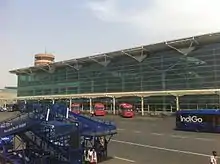
IGI Airport serves as a major hub or a focus destination for several Indian carriers including Air India, Air India Regional, IndiGo, SpiceJet, GoAir, and Vistara. Approximately 80 airlines serve this airport. At present, there are three actively scheduled passenger terminals, including a dedicated Hajj-terminal (Terminal 2), as well as a cargo terminal.
Recently, Delhi Airport operator DIAL has introduced an e-boarding facility for passengers at all the three terminals of the airport, by which all boarding gates will have contactless e-boarding gates with boarding card scanners, which will allow passengers to flash their physical or e-boarding cards to verify flight details in order to proceed for security checks.[47]
Domestic and international operations
Terminal 3 is an integrated terminal used for both international and domestic flights. The Indian carriers operating international flights are Air India, IndiGo, SpiceJet, GoAir, and Vistara.
As far as domestic operations are concerned, Terminal 3 is used by Air India, AirAsia India, Vistara, and select flights of SpiceJet and IndiGo.
GoAir and select flights of IndiGo use Terminal 2 for their domestic operations.
Terminal 1
Terminal 1 is currently used by the low cost domestic carriers, such as SpiceJet and IndiGo. In 2022, Terminal 1D was fully expanded with an arrivals hall, with the goal of enhancing its annual passenger handling capacity from the previous 18 million to 30 million.[48][49] The domestic arrivals Terminal 1C was shut down, leaving 1D as the only operating terminal, so it was renamed as Terminal 1.
Terminal 1A
Terminal 1A was built in the late 1980s to cater to Indian Airlines (now absorbed into Air India). It had to be refurbished after a fire gutted the interiors and DIAL significantly upgraded the terminal. It was used by Air India for its Airbus operations until it shifted to the new Terminal 3 on 11 November 2010.[50] This terminal is now closed and is expected to be torn down on the completion of newer terminals.
Terminal 1B
Terminal 1B was also built in the late 1980s and was used only for domestic departures. Upon the opening of the new domestic departures Terminal 1D in 2009, Terminal 1B got closed and is also expected to be torn down on the completion of newer terminals.
Terminal 1C
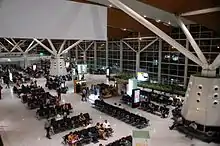
Terminal 1C was also built in the late 1980s and was used only for domestic arrivals. The terminal has been upgraded with a newly expanded greeting area and a larger luggage reclaim area with eight belts. This terminal was shut down upon the completion of the arrivals hall addition of Terminal 1D.
Terminal 1D
Terminal 1D is the newly built domestic departures terminal with a total floor space of 53,000 m2 (570,000 sq ft) and has a capacity to handle 15 million passengers per year.[51] Terminal 1D commenced operations on 19 April 2009.[52] It has 72 Common Use Terminal Equipment (CUTE) enabled check-in counters, 16 self check-in counters, and 16 security channels.[52] It was expanded with a brand new arrivals hall on 24 February 2022 and renamed as Terminal 1.
Terminal 2
Terminal 2 was opened on 1 May 1986, at a cost of ₹95 crores [4] and was used for international flights until July 2010 when operations shifted to Terminal 3. After this, the terminal remained operational for only three months per year catering to Hajj flights.[53] In 2017, after revamping Terminal 2 at a cost of ₹100 crores ,[53] DIAL shifted all operations of GoAir and select operations of IndiGo to that terminal in order to continue expansion work of Terminal 1.[54][55]
Terminal 3
Designed by HOK working in consultation with Mott MacDonald,[56] the new Terminal 3 is a two-tier building spread over an area of 20 acres (8.1 ha), with the lower floor being the arrivals area, and the upper floor being a departures area. This terminal has 168 check-in counters, 78 aerobridges at 48 contact stands, 54 parking bays, 95 immigration counters, 15 X-ray screening areas, shorter waiting times, duty-free shops, and other features.[57][58] This new terminal was timed to be completed for the 2010 Commonwealth Games, which was held in Delhi and is connected to Delhi by an eight-lane Delhi Gurgaon Expressway and the Delhi Metro. The terminal was officially inaugurated on 3 July 2010. All international airlines shifted their operations to the new terminal in late July 2010 and all full service domestic carriers in November 2010. The arrival area is equipped with 14 baggage carousels. T3 has India's first automated parking management and guidance system in a multi level car park, which comprises seven levels and a capacity of 4,300 cars. Terminal 3 forms the first phase of the airport expansion which tentatively includes the construction of additional passenger & cargo terminals (Terminal 4, 5, and 6).[59]
Domestic full-service airlines operate from Terminal 3 including Air India, the national carrier. The Tata & Singapore Airlines airline joint-venture Vistara also operates from Terminal 3.[60] AirAsia India, although a low cost airline, also operates its domestic flights from this terminal. Some flights of SpiceJet and IndiGo were also shifted to Terminal 3 for the expansion of Terminal 1.
WorldMark is an upcoming mixed-use project in the Aerocity hospitality district near Terminal 3.
General Aviation Terminal
India's first general aviation terminal was commissioned in this airport in September 2020. The terminal caters to support the movement and processing of passengers flying through chartered flights or private jets from the airport.[61][62]
Air cargo complex
The air cargo complex is located at a distance of 1 km (0.62 mi) from Terminal 3. It consists of separate brownfield and greenfield cargo terminals.[63] The cargo operations at the brownfield terminal are managed by Celebi Delhi Cargo Management India Pvt. Ltd., which is a joint venture between Delhi International Airport Private Ltd (DIAL) and the Turkish company Celebi Ground Handling (CGH).[64] CGH was awarded the contract to develop, modernise, and finance the existing cargo terminal and to operate the terminal for a period of twenty-five years by DIAL in November 2009.[65] It started its operations in June 2010.[65] In addition to the existing terminal, a new greenfield terminal is being developed in phases by Delhi Cargo Service Centre (DCSC), also a joint venture between DIAL and Cargo Service Center (CSC).[65] The Greenfield cargo terminal project consists of two terminals built over a plot of 48,000 square metres and 28,500 square metres respectively. Phase 1A of the project has been completed and is fully operational.[63] Once the entire project is completed, these two new terminals will have an annual handling capacity of 1.25 million tonnes.[65] The cargo operations of the airport received "e-Asia 2007" award in 2007 for "Implementation of e-Commerce / Electronic Data Interchange in Air Cargo Sector".[66]
Airlines and destinations
Passenger
| Airlines | Destinations |
|---|---|
| Aeroflot | Moscow–Sheremetyevo[67] |
| Air Arabia | Sharjah[68] |
| Air Astana | Almaty[69] |
| Air Canada | Montreal–Trudeau,[70] Toronto–Pearson |
| Air France | Paris–Charles de Gaulle[71] |
| Air India | Abu Dhabi, Agartala, Ahmedabad, Amritsar, Aurangabad, Bagdogra, Bahrain, Bangalore, Bangkok–Suvarnabhumi, Bhopal, Bhubaneswar, Birmingham (UK),[72] Chandigarh, Chennai, Chicago–O'Hare, Coimbatore, Colombo–Bandaranaike, Copenhagen (resumes 2 February 2023),[73] Dammam, Dhaka (resumes 1 January 2023),[74] Dibrugarh, Doha, Dubai–International, Frankfurt, Gaya, Goa, Guwahati, Hong Kong,[75] Hyderabad, Imphal, Indore, Jaipur, Jammu, Jodhpur, Kabul, Kannur, Kathmandu, Kochi, Kolkata, Kozhikode, Kuwait City, Leh, London–Heathrow, Lucknow, Melbourne, Milan–Malpensa (resumes 1 February 2023),[76] Mumbai, Muscat, Nagpur,Nairobi–Jomo Kenyatta, Newark, New York–JFK, Paris–Charles de Gaulle, Patna, Port Blair, Pune, Raipur, Rajkot, Ranchi, Riyadh, San Francisco, Seoul–Incheon, Singapore, Srinagar, Surat, Sydney, Tel Aviv, Thiruvananthapuram, Tirupati, Tokyo–Narita, Toronto–Pearson, Udaipur, Vadodara, Vancouver, Varanasi, Vienna (resumes 17 February 2023),[76] Vijayawada, Visakhapatnam, Washington–Dulles[77] |
| Air India Express | Dubai–International, Madurai, Muscat, Sharjah |
| AirAsia India | Ahmedabad, Bagdogra, Bangalore, Bhubaneswar, Chennai, Goa, Guwahati, Hyderabad, Imphal, Jaipur, Kochi, Kolkata, Lucknow,[78] Mumbai, Pune, Ranchi, Srinagar, Visakhapatnam[79] |
| AirAsia X | Kuala Lumpur–International[80] |
| Akasa Air | Ahmedabad, Bangalore, Mumbai (begins 9 November 2022)[81] |
| Alliance Air | Ahmedabad, Allahabad, Bareilly, Bikaner, Bilaspur, Chandigarh, Dehradun, Dharamshala, Gorakhpur, Jabalpur, Jaipur, Kullu, Nashik, Pathankot,[82] Shimla[83] |
| All Nippon Airways | Tokyo–Haneda[84] |
| American Airlines | New York–JFK[85] |
| Ariana Afghan Airlines | Kabul |
| Asiana Airlines | Seoul–Incheon[86] |
| Azerbaijan Airlines | Baku[87] |
| Batik Air Malaysia | Kuala Lumpur–International |
| Bhutan Airlines | Paro[88] |
| Biman Bangladesh Airlines | Dhaka[89] |
| British Airways | London–Heathrow[71] |
| Cathay Pacific | Hong Kong[90] |
| Druk Air | Paro |
| Emirates | Dubai–International[91] |
| Ethiopian Airlines | Addis Ababa[71] |
| Etihad Airways | Abu Dhabi[92] |
| Finnair | Helsinki[93] |
| Flydubai | Dubai–International[94] |
| Flynas | Riyadh |
| Go First[95] | Ahmedabad, Aizawl, Amritsar,[96] Bagdogra, Bangalore, Bangkok–Suvarnabhumi, Chandigarh, Colombo–Bandaranaike, Dehradun, Goa, Guwahati, Hyderabad, Jammu, Kochi, Kolkata, Leh, Lucknow, Malé, Mumbai, Patna, Phuket, Port Blair, Pune, Ranchi, Sharjah, Srinagar, Surat, Varanasi |
| Gulf Air | Bahrain[97] |
| IndiGo | Abu Dhabi, Ahmedabad, Aizawl, Allahabad, Amritsar, Aurangabad, Bagdogra, Bangalore, Bangkok–Suvarnabhumi,[98] Bhopal, Bhubaneswar, Chandigarh, Chennai, Coimbatore, Colombo–Bandaranaike, Dammam, Dehradun, Deoghar,[99] Dhaka, Dibrugarh, Dimapur, Doha, Dubai–International, Durgapur, Goa, Gorakhpur, Guwahati, Hanoi (begins 29 March 2023),[100] Ho Chi Minh City (begins 28 March 2023),[100] Hubli (begins 14 November 2022),[101] Hyderabad, Imphal, Indore, Istanbul, Jabalpur, Jagdalpur,[102] Jaipur, Jammu, Jeddah, Jodhpur, Jorhat, Kathmandu, Kochi, Kolkata, Kozhikode, Kuala Lumpur–International, Kuwait City, Leh, Lucknow, Madurai, Malé, Mangalore, Mumbai, Muscat, Nagpur, Pantnagar,[103] Patna, Phuket, Port Blair, Pune, Raipur, Rajkot, Ranchi, Riyadh, Sharjah, Singapore, Srinagar, Surat, Thiruvananthapuram, Tiruchirappalli, Tirupati, Udaipur, Vadodara, Varanasi, Visakhapatnam[104][105] |
| Iraqi Airways | Baghdad, Basra |
| ITA Airways | Rome–Fiumicino (begins 3 December 2022)[106] |
| Japan Airlines | Tokyo–Haneda, Tokyo–Narita[71] |
| Jazeera Airways | Kuwait City[107] |
| Kam Air | Kabul |
| KLM | Amsterdam[71] |
| Korean Air | Seoul—Incheon |
| Kuwait Airways | Kuwait City[71] |
| LOT Polish Airlines | Warsaw–Chopin[108] |
| Lufthansa | Frankfurt,[109] Munich[110] |
| Mahan Air | Tehran–Imam Khomeini |
| Malaysia Airlines | Kuala Lumpur–International[111] |
| Myanmar Airways International | Yangon |
| Nepal Airlines | Kathmandu[112] |
| Oman Air | Muscat[113] |
| Qantas | Melbourne[114] |
| Qatar Airways | Doha[115] |
| Saudia | Jeddah, Riyadh[116] |
| Singapore Airlines | Singapore[117] |
| Somon Air | Dushanbe |
| SpiceJet | Ahmedabad, Ajmer, Amritsar, Bagdogra, Bangalore, Belgaum, Chennai, Darbhanga, Dehradun, Dhaka, Dharamshala, Dubai–International, Goa, Gorakhpur, Guwahati, Hyderabad, Jabalpur, Jammu, Jharsuguda, Kabul, Kandla, Kanpur, Kolkata, Kushinagar, Leh, Mumbai, Nashik, Pakyong, Pantnagar, Patna, Pune, Rajkot, Shirdi, Srinagar, Surat, Thiruvananthapuram, Tirupati, Varanasi Seasonal: Jaisalmer, Jodhpur[118] |
| SriLankan Airlines | Colombo–Bandaranaike[119] |
| Swiss International Air Lines | Zürich[120] |
| Thai Airways International | Bangkok–Suvarnabhumi[121] |
| Turkish Airlines | Istanbul[122] |
| United Airlines | Chicago–O'Hare,[123] Newark |
| Uzbekistan Airways | Tashkent[124] |
| VietJet Air | Da Nang,[125] Hanoi, Ho Chi Minh City, Phu Quoc[126] |
| Vietnam Airlines | Hanoi, Ho Chi Minh City[127] |
| Virgin Atlantic | London–Heathrow[128] |
| Vistara | Ahmedabad, Amritsar, Bagdogra, Bangalore, Bhubaneswar, Chandigarh, Chennai, Coimbatore,[129] Dehradun, Dhaka, Dibrugarh, Frankfurt, Goa, Guwahati, Hyderabad, Indore, Jammu, Jodhpur, Kathmandu, Kochi, Kolkata, Leh, London–Heathrow, Lucknow, Mumbai, Paris–Charles de Gaulle, Patna, Port Blair, Pune, Raipur, Ranchi, Sharjah, Singapore, Srinagar, Thiruvananthapuram, Udaipur, Varanasi[130][131] |
Cargo
| Airlines | Destinations | Ref. |
|---|---|---|
| Blue Dart Aviation | Ahmedabad, Bangalore, Chennai, Kolkata, Mumbai | [132] |
| Cathay Pacific Cargo | Bangalore, Hong Kong, Hyderabad, Kolkata, London–Heathrow, Milan–Malpensa, Paris–Charles de Gaulle | [133][134] |
| China Airlines Cargo | Luxembourg, Taipei–Taoyuan | [135][136] |
| DHL Aviation | Hong Kong, Leipzig/Halle | [137] |
| Ethiopian Airlines Cargo | Chongqing, Addis Ababa | [138] |
| FedEx Express | Chengdu–Shuangliu, Dubai–International, Guangzhou, Memphis | |
| Korean Air Cargo | Hanoi, Seoul–Incheon, Vienna | [139] |
| Lufthansa Cargo | Frankfurt, Dhaka, Guangzhou, Jakarta–Soekarno-Hatta, Krasnoyarsk | |
| MASkargo | Kuala Lumpur–International, Chennai | [140][141] |
| Qatar Airways Cargo | Doha | [142] |
| SF Airlines | Shenzhen | [143] |
| Singapore Airlines Cargo | Singapore | |
| SpiceXpress | Bangalore, Hanoi,[144] Leh[145] | [144] |
| Turkish Cargo | Hanoi, Istanbul | [146] |
| UPS Airlines | Bangkok–Suvarnabhumi, Cologne/Bonn, Dubai–International | [147] |
Connectivity


Rail
The nearest railway station is the Palam railway station, located 4.8 kilometres (3.0 mi) and 12 kilometres (7.5 mi) from Terminals 1 and 3 respectively. Several passenger trains run regularly between these stations. Shahabad Mohammadpur railway station is equally close.[148][149]
Terminals 2 and 3 of the airport are served by the IGI Airport metro station on Airport Express (Orange Line) of Delhi Metro. The 22.7 km (14.1 mi) line runs from Dwarka Sector 21 to the New Delhi metro station with trains running every 10 minutes.[150] Terminal 1 is served by the Terminal 1-IGI Airport metro station on the Magenta Line.[151]
Road
The airport is connected by the 8-lane Delhi–Gurgaon Expressway, the busiest inter-city route in India.[152] Air conditioned low-floor buses operated by Delhi Transport Corporation (DTC) regularly run between the airport and the city. Metered taxis are also available from Terminals 1 and 3 to all areas of Delhi.[153]
Future expansion
Terminals 4, 5, and 6 will be built at a later stage, which will be triggered by growth in traffic. Once completed, all international flights will move to these three new terminals. Terminal 3 will then be solely used for handling domestic air traffic. A new cargo handling building is also planned. According to Delhi International Airport Limited (DIAL), these new terminals will increase the airport's annual passenger volume capacity to 100 million.[59]
DIAL submitted a plan in 2016 to the then aviation secretary R N Choubey regarding the expansion of the airport with a new fourth runway and Terminal 4 in a phased manner.[48] The Master Plan of Airport in 2016 was then reviewed and updated by DIAL in consultation with the Airports Authority of India.[154] The terminal construction will start after the fourth runway is completed and Terminals 1 is expanded.[48]
Accidents and incidents
- 1970: The pilot of a Royal Nepal Airlines Fokker F27-200 (9N-AAR) lost control due to severe thunderstorms and downdrafts, crashing just short of the runway. The plane was landing after a flight from Kathmandu, Nepal. Of the five crew and 18 passengers, one crew member was killed.[155]
- 1972: Japan Airlines Flight 471 crashed outside of Palam Airport, killing 82 of 87 occupants; ten of eleven crew members and 72 of 76 passengers died, as did three people on the ground.[156]
- 1973: Indian Airlines Flight 440 crashed while on approach to Palam Airport, killing 48 of the 65 passengers and crew on board.[157][158]
- 1990: An Air India Boeing 747 flying on the London-Delhi-Mumbai route and carrying 215 people (195 passengers and 20 crew) touched down at Indira Gandhi International Airport after a flight from London Heathrow Airport. On application of reverse thrust, a failure of the no. 1 engine pylon to wing attachment caused this engine to tilt nose down. Hot exhaust gases caused a fire on the left-wing. There were no casualties but the aircraft was damaged beyond repair and written off.[159]
- 1993: An Uzbekistan Airlines Tupolev Tu-154 that had been leased by Indian Airlines due to an ongoing pilot strike flipped over and caught fire while landing in bad weather. There were no fatalities, but the aircraft was destroyed by a post-crash fire.[160]
- 1994: A Sahara Airlines Boeing 737-2R4C (registered VT-SIA) crashed while performing a training flight killing all four people on board and one person on the ground.[161] Wreckage struck an Aeroflot Ilyushin-86 (registered RA-86119) parked nearby, killing four people inside.[162]
- 1995: Indian Airlines Flight 492 (IC 492), A Boeing 737-2A8 (Registered VT-ECS), damaged beyond repair when the aircraft overshot the runway at Delhi airport due to pilots error, on its scheduled flight from Jaipur to Delhi.[163]
- 1996: The airport was involved in the Charkhi Dadri mid-air collision when a Saudia Boeing 747-100B, climbing out after take-off, collided with an incoming Kazakhstan Airlines Ilyushin Il-76 chartered by a fashion company, causing the deaths of all 349 people on board the two planes.[164]
- In December 1999, Indian Airlines Flight 814 bound for Delhi was hijacked. The plane was taken to Pakistan, Afghanistan and the UAE. After the turn of the millennium, the plane was allowed to go back to Delhi. One passenger was killed.
See also
- Transport in India
- List of airports in India
- List of busiest airports in India
- Aviation in India
References
Citations
- "Traffic News for the month of March 2021: Annexure-III" (PDF). Airports Authority of India. 14 May 2021. p. 3. Retrieved 14 May 2021.
- "Traffic News for the month of March 2021: Annexure-II" (PDF). Airports Authority of India. 14 May 2021. p. 3. Retrieved 14 May 2021.
- "Traffic News for the month of March 2021: Annexure-IV" (PDF). Airports Authority of India. 14 May 2021. p. 3. Retrieved 14 May 2021.
- About IGI Airport from the Wayback Machine
- eAIP India, OF Airports Authority of India, 1 April 2012, archived from the original on 31 March 2014
- "Fact Sheet". Newdelhiairport.in. Retrieved 5 May 2014.
- "Delhi Airport busier than Mumbai by 40 flights a day". The Indian Express. 16 August 2009. Retrieved 5 May 2014.
- "IGI airport world's second busiest in seat capacity, flight frequency". The Times of India. 3 May 2022. Retrieved 4 May 2022.
- "Delhi's IGI airport is now world's second busiest airport". India Today. 2 May 2022. Retrieved 3 May 2022.
- "Busiest Airports in the World 2022". OAG Aviation. Retrieved 3 May 2022.
- "Why they should stay with the Air Force". Business Line. 9 April 2011. Archived from the original on 12 March 2022. Retrieved 3 May 2022.
- "Mumbai, Delhi airport management to be handed over to pvt cos". Outlook. 2 May 2006. Archived from the original on 14 May 2006. Retrieved 5 May 2014.
- "Advance System at IGIA" (Press release). Press Information Bureau, Government of India, Ministry of Civil Aviation. 12 December 2013. Retrieved 12 December 2013.
- ACI Airport Service Quality Awards 2009, Asia Pacific airports sweep top places in worldwide awards from the Wayback Machine
- "Delhi's IGI is world's 2nd best airport for service quality again-Delhi News , Firstpost". Firstpost. 5 June 2014. Retrieved 23 February 2022.
- "Delhi Airport Ranked First for Service Quality". Business Standard. 17 February 2015.
- "Delhi's Indira Gandhi International Airport bags two international awards in Paris". The Economic Times. 17 March 2015. Retrieved 17 March 2015.
- "Indira Gandhi International Airport is world's best airport for second time in a row". India Today. Retrieved 2 March 2016.
- Devanjana Nag (7 March 2018). "Delhi's IGI, Mumbai's Chhatrapati Shivaji airports beat Singapore Changi, Seoul Incheon to become world's best". The Financial Express. Retrieved 2 May 2018.
- "Leading airports across India in financial year 2020, by number of passengers handled(in millions)". statista. Retrieved 27 January 2021.
- "Delhi's second airport to operate first flight from tomorrow". 10 October 2019.
- "Jewar international airport: Inauguration of Jewar airport by end of December: Nandi | Allahabad News – Times of India". The Times of India. Retrieved 18 December 2019.
- "2020 – Best Airport by Size and Region". ACI World. Archived from the original on 1 March 2021. Retrieved 3 March 2021.
- "Travellers can breathe freely with brand new and improved terminal at Sahar in Bombay". India Today. 31 December 1980. Retrieved 14 August 2019.
- McArthur, Douglas (10 October 2001). "Canada 3000 launches N.A.'s only non-stop India route". The Globe and Mail. Retrieved 7 November 2021.
- Fitzpatrick, Peter (9 October 2001). "Canada 3000 looks east for relief". National Post. Retrieved 7 November 2021.
- McArthur, Keith (22 January 2001). "Canada 3000 plans polar passage to India". The Globe and Mail. Retrieved 7 November 2021.
- "Canada 3000 grounds fleet without warning". CBC. 10 November 2001. Retrieved 6 November 2021.
- "IGI Airport tops world in growth". The Times of India. 19 January 2008. Archived from the original on 11 August 2011. Retrieved 5 May 2014.
- "Brand New Beginning – New Integrated Passenger Terminal 3 Inaugurated at IGIA". GMR Group. 3 July 2010. Retrieved 27 January 2017.
- "Delhi airport international becomes India's 1st to run entirely on hydro and solar energy - The AeroNation". The AeroNation. 22 June 2022. Retrieved 26 June 2022.
- "Delhi, Mumbai airport modernisation – Efforts to ensure a smoother journey". Business Line. Archived from the original on 4 October 2012. Retrieved 16 July 2010.
- "Mumbai, Delhi airport management to be handed over to pvt cos". news.outlookindia.com. Archived from the original on 15 July 2011. Retrieved 16 July 2010.
- "Malaysia Airports Holdings Berhad". Malaysiaairports.com.my. 4 April 2006. Retrieved 16 July 2010.
- Sandeep Sharma (31 March 2010). "Equipment India – India's first infrastructure equipment magazine". Constructionupdate.com. Archived from the original on 28 December 2010. Retrieved 16 July 2010.
- "GMR Infrastructure acquires 10% additional share in Delhi airport overall stake rises to 64%". The Times of India. Retrieved 18 August 2015.
- "Malaysia Airports sells Delhi International Airport stake to GMR". 24 March 2015. Retrieved 18 August 2015.
- ANI (5 January 2022). "End of British-era: Delhi's IGI Airport refurbishes runway". Business Standard India. Retrieved 11 January 2022.
- "AAI commits more airports for CAT III ILS compliance". Daily News and Analysis. ANI. 4 February 2017. Retrieved 4 May 2018.
- Saurabh Sinha; Neha Lalchandani (19 December 2007). "Now separate runways at Delhi airport". The Times of India. New Delhi. TNN. Retrieved 4 May 2018.
- Express News Service (22 August 2008). "Air India Boeing opens Rs 1,000 cr runway at IGIA". Express India. Retrieved 29 October 2012.
- "Delhi's airport opens third runway for round-the-clock operation". Business Line. 31 October 2008. Retrieved 4 May 2018.
- Neha Lalchandani (26 June 2012). "Indira Gandhi International Airport to use 3 runways together". The Times of India. New Delhi. TNN. Retrieved 4 May 2018.
- Saurabh Sinha (7 April 2017). "Mix-up forces Air India plane to do high-speed reject at Delhi Airport". The Times of India. New Delhi. TNN. Retrieved 4 May 2018.
- "Delhi airport's 4th runway to get running by early 2023 increasing its capacity to fly 14 crore people annually". Times Now. 10 August 2022. Retrieved 10 August 2022.
- Faizan Haider (23 August 2017). "Delhi airport new look: Bigger terminals, internal rail but brace for chaos first". Hindustan Times. Delhi. Retrieved 4 May 2018.
- "DIAL introduces e-boarding facility at all three terminals of Delhi airport". The Economic Times. Retrieved 31 December 2021.
- "DIAL plans 4th runway at IGI by 2020, new terminal too". The Times of India. Retrieved 29 May 2017.
- "Delhi: T1 expansion delayed by a year as Covid-19 hits air traffic badly". The Times of India. Retrieved 15 January 2021.
- "End of an era at Terminal 1 A". Hindustan Times. 10 November 2010. Retrieved 3 May 2017.
- "Terminal 1D expansion work to begin by year end". The Hindu. 16 August 2016. Retrieved 3 May 2017.
- "Delhi Airport's new Terminal 1D to open on April 19". Netindian.in. 14 April 2009. Retrieved 3 May 2017.
- Express Web Desk (17 October 2017). "IGI T2: GoAir shifts to new terminal 2 from October 29, but IndiGo, SpiceJet reluctant". The Indian Express. New Delhi. Retrieved 8 May 2018.
- Arindam Majumder (28 October 2017). "Delhi airport T1 upgrade: GoAir shifts to T2; no nod from IndiGo, Spicejet". Business Standard. Retrieved 7 March 2018.
- "Delhi airport: GoAir to shift operations to T2 from October 29". The Indian Express. Press Trust of India. 13 October 2017. Retrieved 7 March 2018.
- "IGI Airport in India to unveil world's third-largest terminal". World Interior Design Network. Archived from the original on 6 June 2010. Retrieved 16 July 2010.
- "Delhi International Airport (P) Limited". Gmrgroup.co.in (GMR). Archived from the original on 10 April 2010. Retrieved 5 May 2014.
- "DIAL to invest Rs 30,000 cr, build 4 new terminals in Delhi". The Economic Times. 16 April 2008. Retrieved 5 May 2014.
- Urvashi Sarkar (23 June 2010). "New terminal to take off at Delhi airport". The Hindu. Retrieved 20 January 2017.
- "Decks cleared for shift of operations to T3". The Times of India. 11 November 2010. Archived from the original on 3 November 2012. Retrieved 18 November 2001.
- "India's first General Aviation Terminal for private jets opens at Delhi Airport – Exclusive landing". The Economic Times. Retrieved 18 February 2022.
- "Indias first General Aviation terminal facility for Private Jets launched at Delhi Airport". Ggmrairports.com. Retrieved 18 February 2022.
- "DIAL invites Expression of Interest (IEoI) for Cargo Village Project at IGI Airport". New Delhi: Official Website of Delhi Airport. 10 February 2013. Retrieved 8 May 2018.
- "Corporate: Celebi Delhi Cargo Terminal Management India Pvt Ltd". Celebi Cargo India. Retrieved 8 May 2018.
- "Air cargo terminals Striving for PPP boost". Indian Transport and Logistics News. Retrieved 8 May 2018.
- "DIAL Cargo gets international 'e ASIA 2007 Award' I.G.I. Airport becomes the First Indian Airport to get this award". 22 September 2007. Archived from the original on 2 February 2017. Retrieved 26 January 2016.
- Joshi, Gaurav (9 May 2022). "Aeroflot Returns To Delhi After 2 Months". Simple Flying. London. Retrieved 21 May 2022.
- "Air Arabia". Airarabia.com. Retrieved 21 May 2022.
- Joshi, Gaurav (26 November 2021). "Kazakhstan's Air Astana Re-Launches A320 Flights to Delhi". Simple Flying. London. Retrieved 21 May 2022.
- "Air Canada Expands Capacity from Eastern Canada to India; Launches New Non-Stop Service from Montreal to Delhi" (Press release). Montréal: Air Canada. Retrieved 22 February 2022.
- Staff writers (15 November 2021). "India reopens gates to tourists from 99 countries as COVID-19 cases decline". Business Today. New Delhi: Living Media. Retrieved 15 November 2021.
- Houghton, Alistair (4 October 2022). "Birmingham Airport chiefs 'thrilled' as Air India launches new flights to Delhi and Amritsar". Business Live. Retrieved 4 October 2022.
- "AIR INDIA TENTATIVELY PLANS COPENHAGEN RESUMPTION IN FEB 2023". Aeroroutes. Retrieved 20 October 2022.
- "AIR INDIA TENTATIVELY FILES DELHI – DHAKA RESUMPTION IN 1Q23". Aeroroutes. Retrieved 25 October 2022.
- Team, Editorial (21 December 2021). "Air India To Operate Additional Flights Between Delhi And Hong Kong Starting Jan 02". Travelobiz. Retrieved 22 February 2022.
- "AIR INDIA TENTATIVELY RESUMES MILAN / VIENNA SERVICE IN 1Q23". Aeroroutes. Retrieved 19 October 2022.
- "Air India and Alliance Air schedule list". Air India. Retrieved 8 November 2018.
- "AirAsia India to Lucknow". AirAsia India. Retrieved 16 June 2022 – via Twitter.
- "AirAsia flight schedule". airasia.com. Archived from the original on 4 October 2018. Retrieved 8 November 2018.
- Karp, Aaron. "AirAsia X Rebuilding Network After Two-Year Grounding". Routesonline. Retrieved 6 April 2022.
- "Akasa Air to commence Mumbai-Delhi service in Nov-2022". CAPA. Retrieved 19 October 2022.
- "Flight Schedule". Alliance Air. Retrieved 27 March 2021.
- Bisht, Gaurav (26 September 2022). "Delhi-Shimla daily flight resumes after two years". Hindustan Times. Retrieved 27 September 2022.
- "Japan's ANA launches direct flight between Chennai and Tokyo". India Today. ANI. 20 November 2019. Retrieved 3 May 2022.
- "American Airlines flight booking". American Airlines. Retrieved 22 October 2021.
- "Asiana Airlines to reopen route to India, offer more to Japan, others". Yonhap News Agency. 25 April 2022.
- "AZAL to Start Flights to New Delhi in August". Azerbaijan Airlines. 22 July 2022. Retrieved 25 July 2022.
- "BHUTAN AIRLINES TENTATIVELY RESUMES SCHEDULED SERVICE IN MID-SEP 2022". Aeroroutes. Retrieved 14 August 2022.
- "Your Home In The Sky". Biman Bangladesh Airlines. Retrieved 22 February 2022.
- Moore, Jamie (24 April 2022). "Cathay Pacific to restart flights between Hong Kong and India in May". Simple Flying. London. Retrieved 25 April 2022.
- "Our current network and services | COVID-19 information hub | Emirates India". Emirates. Retrieved 22 February 2022.
- "Archived copy". Etihad Airways. Archived from the original on 10 July 2021. Retrieved 25 May 2022.
{{cite web}}: CS1 maint: archived copy as title (link) - "Fly to over 100 destinations with Finnair". Finnair. 19 November 2021.
- "Flydubai Resumption of Flights". Flydubai.com.
- "Budget airline GoAir rebrands as Go First". The Hindu. Chennai: The Hindu Group. 13 May 2021. Retrieved 22 February 2022.
- "Go First Introduces flights for Amritsar, Surat, and Dehradun". Flygofirst.com. Retrieved 10 November 2021.
- "Hold Up". Gulfair.com. Retrieved 22 February 2022.
- Karp, Aaron. "IndiGo Restoring India-Thailand Links". Routesonline. Retrieved 15 March 2022.
- Pandey, Sunil (30 July 2022). "Deoghar Airport: दिल्ली से अब सीधे देवघर, आज से फ्लाइट सर्विस शुरू, पहली 'VIP' लैडिंग, जानें शेड्यूल". Navbharat Times (in Hindi). Retrieved 30 July 2022.
- "IndiGo tentatively lists Delhi–Vietnam routes in NS23". Aeroroutes. Retrieved 17 June 2022.
- "Now, fly direct to Delhi from Hubballi". The Hindu. 12 October 2022. Retrieved 12 October 2022.
- Singh, Rakesh K (24 April 2022). "Air courier service for paramilitary, IB, NDRF resumes for 4 routes". The Pioneer. Retrieved 27 April 2022.
- "IndiGo strengthens domestic network with the launch of Pantnagar as 72nd destination in 6E network" (PDF). IndiGo. Retrieved 23 February 2022.
- "Flight Schedule for Domestic & International Flights". IndiGo.in. Retrieved 25 December 2018.
- "International Destinations". Goindigo.in. Retrieved 20 November 2021.
- Bodell, Luke (2 September 2022). "Italy's ITA Plans New Delhi Flights From December 3rd". Simple Flying. Retrieved 5 September 2022.
- "Jazeera Airways". Booking.jazeeraairways.com. Retrieved 22 February 2022.
- "Lot Booking". Lot.com. Retrieved 22 February 2022.
- "Flight from Frankfurt to Delhi". Lufthansa.com. Retrieved 22 February 2022.
- "Flight Search". Mobile.lufthansa.com. Retrieved 22 February 2022.
- "Malaysia likely to reopen to international travellers from January 1". The Times Of India. Retrieved 17 November 2021.
- "International || Nepal Airlines Corporation". Nepalairlines.com.np. Retrieved 22 February 2022.
- Air, Oman. "Oman Air | The New Wings of Oman". Omanair.com. Retrieved 22 February 2022.
- "Qantas and Jetstar gear up for accelerated border opening". Qantas. 22 October 2021. Retrieved 22 October 2021.
- "Flight timetable". Booking.qatarairways.com. Retrieved 22 February 2022.
- "SAUDIA | Book Flights | Hotels | Holidays Packages". M.saudia.com. 12 March 2020. Retrieved 21 February 2022.
- "Singapore Airlines to start India Flights". The Times of India. Retrieved 23 November 2021.
- "SpiceJet flight schedules". Official Website of SpiceJet. Retrieved 11 September 2018.
- "Archived copy". book.srilankan.com. Archived from the original on 31 March 2019. Retrieved 25 May 2022.
{{cite web}}: CS1 maint: archived copy as title (link) - "Homepage". Swiss.com. Retrieved 22 February 2022.
- "Thai Airways to resume international services to 36 destinations including Denmark and Sweden". Retrieved 15 October 2021.
- "Turkish Airlines Booking Availability". 22 November 2021. Archived from the original on 22 November 2021. Retrieved 22 May 2022.
- "Flights from New Delhi to Chicago". United.com.
- "Ticket Search". Book.uzairways.com. Retrieved 22 February 2022.
- "VietJet Air Plans 3Q22 India Network Expansion". Aeroroutes. Retrieved 20 March 2022.
- "Travel India to Vietnam for just Rs 9! Vietjet announces super-saver air tickets on THESE routes". Zee News. 24 August 2022. Retrieved 9 September 2022.
- "Vietnam Airlines launches direct route to India". Vietnam+. 15 June 2022. Retrieved 15 June 2022.
- "Flights to London (LON) from Delhi (DEL) 2022/2023| Virgin Atlantic". flights.virginatlantic.com. Retrieved 22 May 2022.
- "Vistara to start flights from Coimbatore to Delhi, Mumbai, Bengaluru from May 20". Business Line. Chennai: The Hindu Group. Press Trust of India. Retrieved 14 April 2022.
- "Vistara domestic destinations". Vistara. Retrieved 8 November 2021.
- "Vistara international destinations". Vistara. Retrieved 8 November 2021.
- "Destinations, Blue dart Aviation". Official Website of Blue Dart Aviation. Retrieved 10 September 2015.
- "Check Flight Schedule: Cathay Pacific Cargo". Retrieved 2 May 2018.
- "Network". Cathay Pacific Cargo. Retrieved 2 May 2018.
- "China Airlines Cargo resumes freighter operations to India after four years | Air Cargo News". Stattimes.com. Archived from the original on 31 July 2017. Retrieved 2 December 2016.
- "China Airlines to resume cargo services to India | FOCUS TAIWAN – CNA ENGLISH NEWS". Focustaiwan.tw. 25 August 2016. Retrieved 2 December 2016.
- "DHL AVIATION – FLIGHT SCHEDULE" (PDF). Globe Air Cargo. Retrieved 2 May 2018.
- "Cargo Network". Ethiopian Airlines. Archived from the original on 8 April 2014.
- "Korean Air launches cargo flights to Delhi, India". Eturbonews. 10 July 2018. Retrieved 2 August 2018.
- "Fleet & Network". Official Website of MASkargo. Retrieved 4 May 2018.
- "MASKargo adds new intra-Asia routing in S18". Routesonline. Retrieved 8 July 2018.
- "Summer 18 Freighter Schedule Issue 3: 1st May to 27th Oct 2018" (PDF). Official Website of Qatar Airways Cargo. p. 2. Retrieved 5 May 2018.
- "SF Airlines commences Shenzhen-Delhi service". CAPA. Retrieved 21 October 2019.
- "Press Release News Page". Spicejet.com. Retrieved 18 December 2019.
- "SpiceJet launches dedicated freighter services to Leh in Ladakh". Business Standard. Retrieved 10 December 2020.
- "WINTER 2016 CARGO SCHEDULE (16–22 JAN 2017)" (PDF). Turkish Airlines Cargo. Archived from the original (PDF) on 23 June 2017. Retrieved 27 February 2017.
- "With UPS using Delhi airport as hub for freighter, North-based firms may benefit - the Hindu BusinessLine". Archived from the original on 29 October 2019. Retrieved 29 October 2019.
- "Shahabad Mohamadpur/SMDP Railway Station Satellite Map – India Rail Info – A Busy Junction for Travellers & Rail Enthusiasts". India Rail Info. 26 April 2010. Retrieved 24 January 2012.
- "Palam/PM Railway Station Satellite Map – India Rail Info – A Busy Junction for Travellers & Rail Enthusiasts". India Rail Info. 26 April 2010. Retrieved 24 January 2012.
- "Website Airport Metro Express Delhi". delhiairportexpress.com. Archived from the original on 20 June 2012. Retrieved 1 December 2016.
- Sidharatha Roy (24 May 2018). "Metro walks the talk on connect to terminal 1". The Times of India. New Delhi. TNN. Retrieved 28 May 2018.
- TNN (8 January 2009). "Easy entry for Visa card holders". The Times of India. Archived from the original on 17 September 2011. Retrieved 16 September 2010.
- "To and From Delhi Airport by Taxi". Archived from the original on 30 November 2016. Retrieved 16 December 2018.
- "Master Plan for Expansion of IGI Airport". Press Information Bureau. 15 March 2017. Retrieved 29 May 2017.
- "Accident description". aviation-safety.net. Aviation Safety Network. 25 January 1970. Retrieved 5 May 2014.
- 14 June 1972 Douglas DC-8-53, Japan Air Lines–Aviation Safety Network. Retrieved 23 March 2009.
- "ASN Aircraft accident Boeing 737-2A8 VT-EAM Delhi-Indira Gandhi International Airport (DEL )". Aviation Safety Network. Flight Safety Foundation. Retrieved 31 May 2016.
- "Airline crash in New Delhi." United Press International (UPI) at Lodi News-Sentinel. Friday 1 June 1973. p. 8 (Google News p. 5/16). Retrieved 28 October 2014.
- "Aviation Safety". Aviation Safety. Retrieved 5 May 2014.
- "Crash of a Tupolev TU-154B-2 in New Delhi | Bureau of Aircraft Accidents Archives". Baaa-acro.com. Retrieved 11 June 2021.
- Ranter, Harro. "ASN Aircraft accident Boeing 737-2R4C VT-SIA Delhi-Indira Gandhi International Airport (DEL)". aviation-safety.net. Retrieved 10 June 2020.
- Ranter, Harro. "ASN Aircraft accident Ilyushin Il-86 RA-86119 Delhi-Indira Gandhi International Airport (DEL)". aviation-safety.net. Retrieved 10 June 2020.
- "Major air crashes in India in two decades". The New Indian Express. Retrieved 1 December 2016.
- Burns, John F. (5 May 1997). "One Jet in Crash Over India Ruled Off Course". The New York Times. Retrieved 24 May 2010.
Bibliography
- Jefford, C.G. (1988). RAF Squadrons. A comprehensive record of the movement and equipment of all RAF squadrons and their antecedents since 1912. Shrewsbury: Airlife. ISBN 1-85310-053-6.
- Lake, A (1999). Flying units of the RAF. Shrewsbury: Airlife. ISBN 1-84037-086-6.
External links
![]() This article incorporates public domain material from the Air Force Historical Research Agency.
This article incorporates public domain material from the Air Force Historical Research Agency.
![]() Media related to Indira Gandhi International Airport at Wikimedia Commons
Media related to Indira Gandhi International Airport at Wikimedia Commons
- Indira Gandhi International Airport, official website
- GMR Delhi International Airport Limited (DIAL)
- Accident history for DEL at Aviation Safety Network


